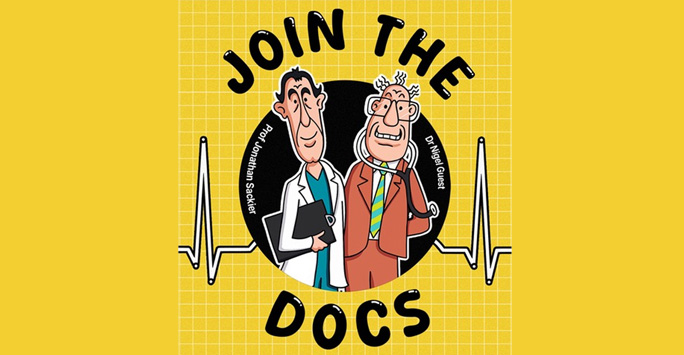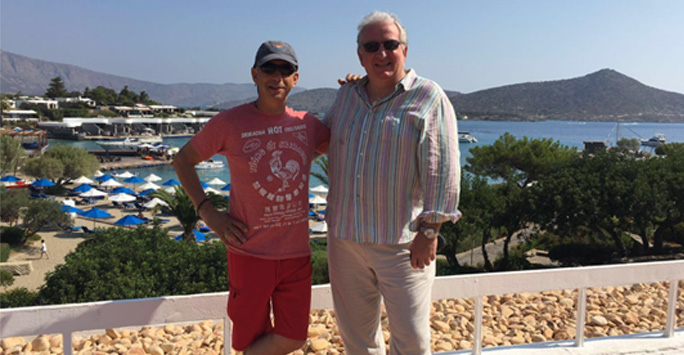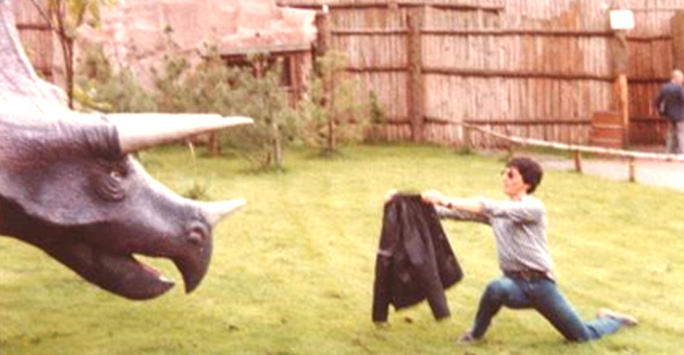
What do you get when two School of Medicine alumni combine medical expertise with a passion to share knowledge? A podcast, of course!
Professor Jonathan Sackier and Dr Nigel Guest, both Class of 1981 alumni and close friends, were inspired to create their podcast ‘Join the Docs’, through a desire to invite audiences to delve into health-related topics served with a delightful side of humour.
Along with a little help from Slim the skeleton, they welcome the audience into their conversation to share the intriguing, the implausible, and the marvellous medical stories that are sure to pique your interest whilst learning something new. From itching, bed bugs and bruises, to anaemia, anatomy and aortic aneurysms - ‘the docs’ cover it all.
The two met during their studies here at the School of Medicine, forming a steadfast friendship along the way. Since then, their careers have flourished in diverse fields, from Primary Care to research, and even a spot of presenting. They sat down to tell us about their fond memories of Liverpool, their career highlights, and their motivation to launch their podcast.
Can you tell us what inspired you to pursue a career in medicine?
Jonathan: I guess it was a number of things. First, I had an appendicectomy as a child and was so impressed with both how kind my GP was, and how ‘in control’ yet compassionate the surgeon was. And when he agreed to let me see my appendix in the jar of formalin, that was it, I was hooked! How could that tiny worm-like object have made me so ill? I was the first person in my family to go to university, so everything was an adventure!
Nigel: It was our GP in Dudley, West Midlands. He drove an Aston Martin! Later he became a close personal friend… sadly I discovered general Practice didn’t fund the Aston Martin.

(L-R) Professor Jonathan Sackier and Dr Nigel Guest on a boys trip to Crete
What attracted you to do your degree at the University of Liverpool?
Jonathan: There was a mythology about the town; The Beatles, comedy, everything. I grew up in London as a Tottenham Hotspur supporter and had seen other places in Britain when my dad took me to away football matches. Then, as now, Liverpool was a force in football, and given I knew that I wanted to experience life away from ‘the smoke’, Liverpool was high on the list. The brochure I obtained when going through the process sold me; the promise of a brand-new hospital, the appeal of an urban campus.
Nigel: It’s just a great city. My cousin and her husband, a vet, studied there and thoroughly enjoyed its atmosphere and their time at University.
There must have been some great highlights during your time here. What did you enjoy the most?
Jonathan: How much time have I got! So many things: finding my favourite pubs (The Philharmonic, Peter Kavanaghs, The Grapes, Ye Cracke), the ferry, playing football with my friends, the Medical Students Society, getting toffed-up for the Men’s Medical Dinner, the old anatomy lecture theatre. But most of all, the friendships I made, most of which still endure - we speak to and see each other regularly.
Nigel: Much the same really – the camaraderie, great lifelong friends, the shared experience of living in a great city.
Do you remember your first day at the University?
Jonathan: Absolutely, my first days!
I remember being dropped off by my dad at Rankin Hall on the old Carnatic site, feeling very lost, very young and totally clueless and then meeting a group of lads around a table football game - we ended up best mates.
Going in on that first day is so clear in my mind - I felt like a real doctor even though I was utterly clueless. But then again, we all were. I suppose in some ways we were all relatively capable students at our respective schools, but now we were surrounded by people who we all thought were smarter than us!
Nigel: Yes…we were told by the professor of anatomy we were the best of the best to get into medical school, and then we were introduced to our cadavers to dissect. A day of contrasts really – highs and lows! I’m always shocked by how much those first few days have shaped the rest of my life. The alphabetical allocation of colleagues to bodies has bizarrely defined long-lasting friendships.
Can you tell us what you did upon graduating?
Jonathan: I did my house jobs at Broadgreen (which I loved) and I learned so much from the nursing staff. Everyone was so friendly there, the switchboard, catering, porters, everyone. I had already decided to pursue a surgical career because of the influence of Professor (Sir) Robert Shields. He was a brilliant surgeon, a great educator and one of the kindest men - I remained in touch with him until he died, and he always treated me kindly and wisely. He also had a wicked sense of humour. Additionally, I loved the dynamism of surgery and got involved in some research even before I qualified.
I then went through surgical training in Glasgow and London and loved the combination of clinical practice, research and academic writing and presenting.
As a result of some procedures I helped develop, I was recruited to the United States, first in Los Angeles at Cedars-Sinai and UCLA and later, on the east coast at George Washington University in DC. I finally came back to the UK after many years away.
Nigel: I initially went to Ormskirk with three other friends, again lifelong. There were only 6 of us in total, but we had great fun - we had our own croquet ‘lawn’ and tennis court and lived in a cottage with its own bar!
Subsequently, I toyed with Obs and Gynae, but my true love was primary care, so I trained in Liverpool, Ormskirk and the Wirral, becoming a GP in Ellesmere Port and for the last 25 years in South Manchester.

Dr Nigel Guest as a ship Medical Officer
Your careers have been fascinating! What have been some career highlights for you?
Jonathan: I have been so blessed to have a rich and varied career; I am reliably informed that we spend a long time dead, so I like to cram in a lot. First, I would say the people I have met and collaborated with all around the world, whether I was teaching in China, presenting work in South America, or doing a mini sabbatical with the Royal Flying Doctor Service in Queensland, Australia.
I was also privileged to help develop laparoscopic surgical techniques with people like George Berci who at 103 is still innovating.
And then developing AESOP, the first surgical robot with Yulun Wang - we still do stuff together. My work – and English accent – saw me invited onto TV in the States; if you are British over there it buys you 20 IQ points! This led to friendships with some awe-inspiring people in the media who are friends to this day. One TV interview about research can reach millions of people, whereas the academic article that inspired it might reach a few thousand!
Nigel:
Being a general practitioner at core but becoming the CEO / accountable officer of a Clinical Commissioning Group is a highlight, leading the commissioning of multimillions of healthcare whist bringing innovation and challenge.
Subsequently developing a medical technology and medical system re-design consultancy, and again working with close friends and colleagues. I am part of two other innovative companies, with longstanding friends developing new Medtech and clinical services. Then there is the Podcast! Still never bought an Aston Martin.

Professor Jonathan Sackier playing matador with a Triceratops on a road trip while at medical school
You recently launched your “Join the Docs” podcast – what motivated you to start it?
Jonathan: Two things: first, the media can help deliver powerful messages that might save or improve a life. Second, Nigel Guest and I have been friends since day one in Liverpool and have what I believe is called a ‘bromance’ in pop culture; we amuse each other, if nobody else! During the Covid pandemic, Nigel and I started riffing on medical themes over Zoom (he lives in Greater Manchester, and I am in London) and after friends and family encouraged us, we thought “why not actually release this?” And so Join the Docs was born.
Nigel: Shared experience and laughter with a dear lifelong friend enjoying as we do together all aspects of medicine and life from the sublime to the ridiculous, bringing our different experiences to a wider audience, sharing the joyous privilege that practising medicine is!
Who is your podcast aimed at and why?
Nigel: Everyone...the subject content mix and the humour is universal in appeal hopefully.
Jonathan:
We endeavour to convey our passion for a life of learning combined with news-you-can-use and some giggles.
The smart marketeers we have spoken to tell us that material like this in video format is consumed by males aged 16 – 28 and the more detailed content, the 30-minute podcast (about Nigel’s attention span!) appeals to women of all ages as they tend to be better attending to their health and that of their family members.
What’s surprised you most since starting the podcast?
Nigel: The warmth (and volume) of response, especially from unexpected sources and hearing of listener experiences of disease awareness and even diagnosis as a result of listening.
Jonathan: How technical it is! And I knew nothing about social media and what drives people to watch it. There is a lot of psychology involved, how one uses the right phrase to capture peoples’ attention and get them to listen or watch. We are very fortunate to be helped by a great team. Nigel found a studio run by Spike, a very smart young man who knows his stuff and his team includes a social media guru, Ruby. We also engaged Robin Gott who I attended school with to do episode-specific artwork. Rob is a total delight and cracks us up with the lens he views the world through!
Do you have a favourite episode so far?
Jonathan: That is tough as all we have released and recorded for future release are, we hope, fun and informative. From our first episodes on strange things retrieved from various bodily orifices to anaemia, bruising, itching, abdominal aortic aneurysms, and ones ‘in the can’ on topics as diverse as diseases dogs may cause and prevent, Dr. Google, bizarre sports injuries and on and on.
You can find them all on the website and subscribe on Spotify and Apple podcasts.
Nigel: Orifices 2… I finally get a word in edgeways!
What do you hope listeners gain from it?
Jonathan:
If just one person is inspired by listening to address a problem, then it was worthwhile; and we have already been told that a few times!
Hopefully others will be motivated to read more about the wonders of medical science, to avoid doing silly things and maybe, just maybe, someone out there will choose to study medicine! I remember talking to parents after I delivered their child while a medical student in Liverpool and they told me they were going to name their son after me. That made me smile a lot!
Nigel: Laughter, knowledge and provoked thought.

(L-R) Professor Jonathan Sackier and Dr Nigel Guest enjoying a football match - the image that inspired the cartoon
What is coming up soon in your podcasts?
Jonathan: We have some special guests coming up including England footballer and pundit Glenn Hoddle who suffered a cardiac arrest in a TV studio on his 61st birthday and thankfully someone was there to resuscitate him. We are also talking to John Oates, Rock and Roll Hall of Fame recording artist, Mike Einziger, lead guitarist for Incubus, Montel Williams, TV talk show host and many more because everyone has a health story to tell. We are also launching some cool stuff with Robin Gott and aiming to support several health charities. And Nigel and I are hoping to take the ‘show on the road’ and do some live events – maybe starting in Liverpool which would be pretty cool!
Do you have any advice for our current student doctors?
Nigel: Embrace it, enjoy it, don’t fear it… it’s plumbing and wiring, no more. Just appreciate the privilege. It’s a vocation, so treat it as such and never forget it is service to patients so be kind and always go the extra mile.
Jonathan: Do it with passion, enjoy every minute of medical school and your postgraduate training! Without a doubt it can be the best, the most rewarding profession. But please, remember why you chose to study medicine, it’s about helping people in the most terrifying and vulnerable times of their lives, to be allowed the immense privilege of being trusted to help? Nothing beats it.
Thank you to Professor Sackier and Dr Guest for taking the time to chat to us. Take a listen to the Join the Docs podcast (link) and we’re sure you’ll agree – laughter really is the best medicine!